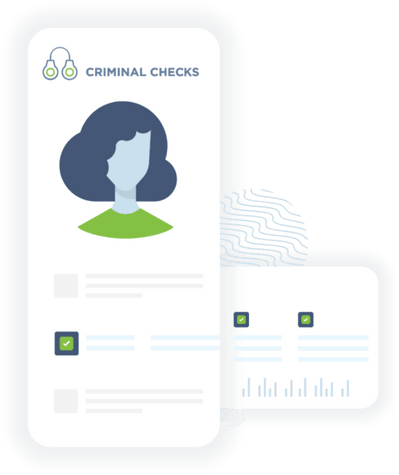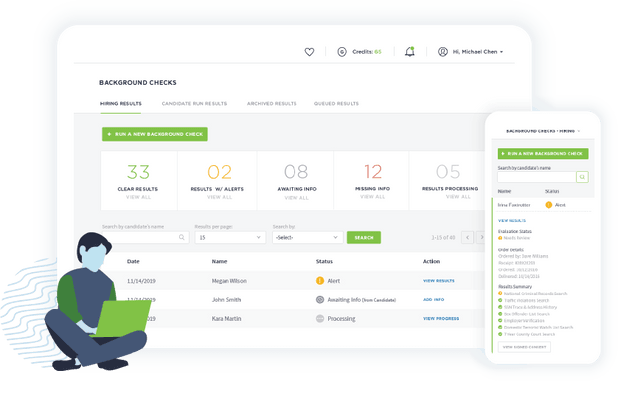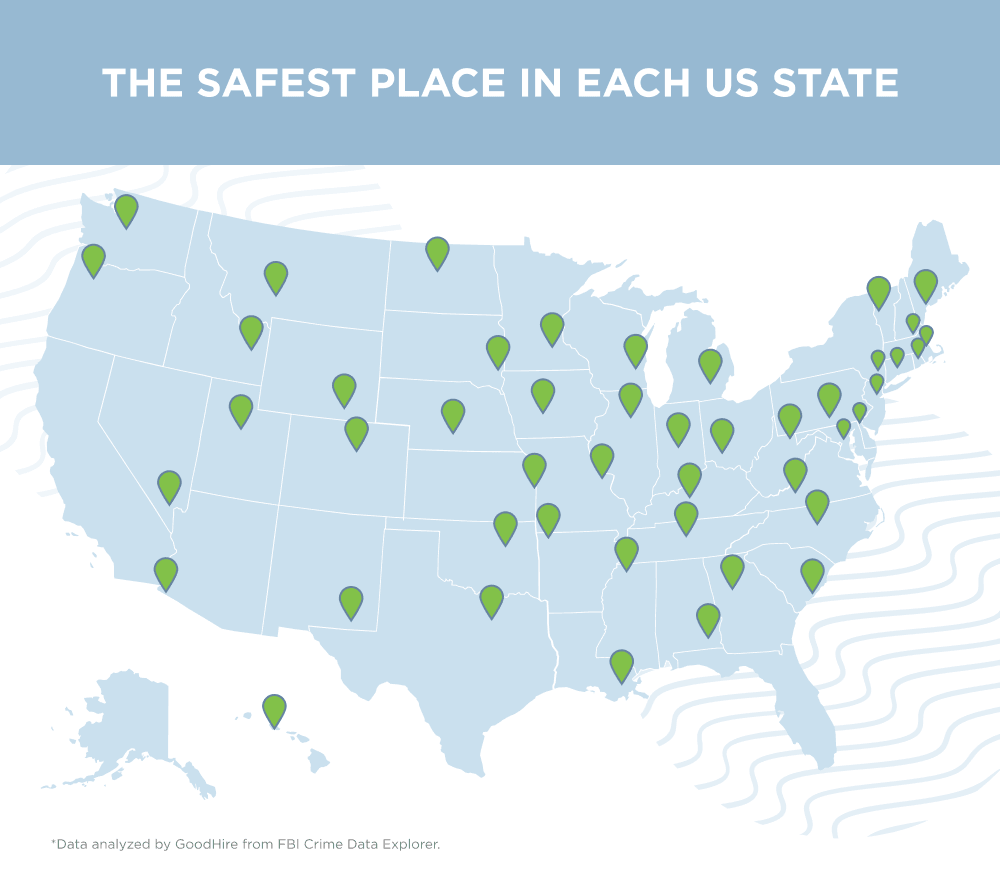Criminal Background Check
Criminal Background Check For Employment
Criminal background checks help you make informed decisions and build a trustworthy team.
Trust & Safety
Why Criminal Background Checks Are Essential
A comprehensive criminal background check helps you build a team you can trust, while also mitigating risk and protecting your company’s reputation. Using criminal record background checks during your hiring process helps you:
- Minimize risk and create a safe, secure workplace
- Make fair decisions for fair chance hiring
- Comply with federal, state, local, and industry regulations
More than 100,000 employers of all sizes have trusted GoodHire for better background checks.
Reliable, Accurate Results
What You’ll Learn From Criminal
Background Checks
A criminal history record helps you make an informed decision about your candidate and assess any risks associated with bringing someone with a criminal record onboard. Searching national, federal, state, and county databases in the United States can
A criminal background check may reveal a candidate’s criminal history information, including:
- Felony criminal convictions, including murder, rape, kidnapping, arson, theft (values larger than $500), and aggravated assault
- Misdemeanor criminal convictions, such as vandalism, trespassing, public intoxication, disorderly conduct, prostitution, and theft (values less than $500)
- Pending criminal cases
A criminal record check may also report history of incarceration as an adult, arrests pending prosecution, active warrants, and infractions.
Types of Searches
GoodHire’s Suite of Criminal Background Checks
Nationwide Criminal
Databases Search
Searches 850 million records from thousands of jurisdictions in the United States to report crimes prosecuted in state and local courts, including Department of Corrections, Administrative Office of Courts and state, county and township courts.
Federal Criminal Court Search
Searches the U.S. Federal Government’s PACER criminal record system, a national index for U.S. district, and appellate courts, to report crimes that are prosecuted under federal criminal law in federal courts such as tax evasion, fraud, embezzlement, identity theft, interstate trafficking, and kidnapping.
County Criminal Court Search
Searches county courthouses to find any convictions and pending cases including DUI, DWI, assault, theft and burglary. Searches are available for all 3,200 county courthouses in all 50 states. Since many counties have not digitized their court records, professional court runners search these county court records.
Statewide Criminal Records Search
Searches state level criminal records from sources including State Judicial Court System, State Police, State Department of Law Enforcement, Administrative Office of the Courts for infractions, misdemeanors, and felonies. Since some states don’t include complete county history, county-specific searches are recommended to ensure thorough results.
Sex Offender Registry Search
Searches registries across all states to uncover where a candidate may be currently registered as a sex offender.
Domestic Watch List Search
Searches U.S. government sanction and watch lists, including the FBI’s Most Wanted and the Office of Foreign Assets Control (OFAC). Learn about our sources.
Global Watch List Search
Searches international sanction and watch lists, including INTERPOL Most Wanted list and the European Union terrorism list. Learn about our sources.
International Criminal Records Search
Searches a foreign country’s criminal records for candidates with international backgrounds who are working in the U.S. Each of 223 countries has its own application checklist detailing required information, forms and turnaround times.
Compliance
What You Need To Know When
Reviewing Criminal Search Results
Employers using a Consumer Reporting Agency (CRA), like GoodHire, to run a criminal history record check to assess candidates during the hiring process have important responsibilities to ensure a fair and respectful process for the candidate, and to comply with various laws and regulations that govern employment screening. Find out how GoodHire’s built-in tools and workflows help you stay compliant.
Federal Fair Credit
Reporting Act (FCRA)
When the results of a criminal records search prompts a decision to deny employment, the FCRA requires employers to follow specific adverse action steps.
Equal Employment Opportunity Commission (EEOC) & Title VII
The EEOC offers recommended guidelines to conduct individualized assessments so employers can make fair, informed decisions.
Ban The Box & Fair Hiring Laws
A patchwork of state, county, and city laws move the criminal history inquiry until later in the hiring process. These laws may apply based on both the employers’ and candidates’ locations. Further, some local laws may also have specific requirements for the adverse action process.
Your Organization’s Hiring Policy
If your business is conducting background checks, your hiring and screening policies should be consistent and compliant to prevent discrimination and avoid litigation and enforcement from federal agencies.
Criminal Background Checks: What You Need To Know
Employers and volunteer organizations may use a criminal background check service to assess whether a candidate is honest, trustworthy, or may potentially pose a threat to others. Screening may also help protect company assets, mitigate risk, and avoid potential negligent hiring lawsuits.
A criminal background check is an investigation into a candidate’s criminal history. Employers often include this type of background check in their pre-employment screening process to help select candidates who are eligible and qualified for the position they want to fill. While criminal background checks can help employers make informed hiring decisions, they must be conducted in a way that complies with local, state, and federal hiring laws. Here’s what you need to know about conducting criminal background checks.
89% of all criminal background checks are completed within one hour.
Get StartedWhat is a criminal background check?
A criminal background check may search national, federal, state, or county criminal databases to determine if a person has a history of misdemeanor or felony criminal convictions or pending criminal cases. Different searches may reveal different offenses, depending on the court records you include. For example, a state background check will only report criminal activity in that selected state’s criminal courts and state police systems. However, employers may choose to search multiple states and counties based on where the candidate has lived, or, if a nationwide search reveals potential criminal history in more than one state.
A criminal background check only shows criminal information about a candidate, and therefore is often only part of a comprehensive pre-employment screening. The difference between a background check and a criminal background check is the scope of the search. A comprehensive background check goes beyond a criminal records search and may include multiple screenings, such as driving record (MVR) checks, employment verification, credit history, and more.
Employers may select which screenings to include based on requirements established by laws and regulations, your organization’s background check policy, and the relevancy to the positions for which you’re hiring.
What shows up on a criminal background check?
A criminal background check for employers can show felony and misdemeanor convictions, infractions, and pending criminal cases. Some searches may also report a history of incarceration as an adult, arrests pending prosecution, active warrants, and infractions.
Depending on the scope of the search, domestic and global watchlists may be included, which show industry bans, such as healthcare sanctions. Sex offender registry checks may also be included, which show the offender’s date of registration and current status.
Here are some offenses that may show up on a criminal record check:
| Type of Record | Examples |
|---|---|
| Felony criminal convictions | Murder, manslaughter, rape, kidnapping, arson, theft (values larger than $500), and aggravated assault |
| Misdemeanor criminal convictions | Vandalism, trespassing, public intoxication, disorderly conduct, prostitution, and theft (values less than $500) |
| Infractions or violations | Jaywalking, littering, drinking in public, disturbing the peace, boating violations, building permit violations |
Petty offenses are typically punishable by fines but not jail time and may not be considered criminal offenses in all jurisdictions. Depending on the jurisdiction, infractions may or may not show up on a criminal history record. Under federal law, when you perform a background check using a consumer reporting agency (CRA), non-criminal records may only be reported if they occurred within the last seven years. Arrests that didn’t lead to a conviction within the last seven years may appear in some background checks.
When you receive a candidate’s criminal history report, it may include the criminal charge, disposition, and disposition date. It’s important that employers understand how to read a background check to make informed decisions about job candidates and use the results in compliance with fair hiring laws.
How long does a criminal background check take?
The amount of time a criminal background check takes depends on the scope of the search and whether you choose to search on your own or partner with a consumer reporting agency (CRA), like GoodHire. Generally, the industry average for a background check for criminal records takes one to three business days, though it varies.
For example, database searches, such as Social Security number (SSN) traces, national background checks, and sex offender registry searches, often return results within minutes. Other searches, such as county criminal record searches in jurisdictions without digitized records, may take longer. With GoodHire (a Checkr company), 89% of all criminal history check searches are completed within one hour.
89% of all criminal background checks are completed within one hour.
Get StartedBest criminal background checks
The best criminal background checks provide accurate information for a competitive price with easy-to-understand results. Here’s a look at some of the best criminal background check providers for employers and individuals.
For employers
Whether you’re a large organization or a small business, you should look for a background check provider that complies with the Fair Credit Reporting Act (FCRA) and can be used for employment purposes. The top three criminal history background check providers include:
- GoodHire (a Checkr company) offers customizable packages for comprehensive criminal history at the national, federal, state, and local levels with international options also available. Built-in tools and workflows help enable compliance, such as adverse action, while continuous criminal checks notify you of reportable changes within your active workforce. Sign up today.
- Sterling offers multiple criminal history background check options for a variety of industries They also offer international criminal history checks.
- HireRight offers county, state, and national criminal records searches within the US, with the option to supplement criminal background checks with information from additional sources.
For individuals
Performing a background check on yourself can give you an idea of what prospective employers may see if they conduct a criminal background check, so you know what to expect. The following are some of the best criminal background checks for individuals:
- GoodHire (a Checkr company) makes reviewing your criminal records simple. Individuals can purchase a personal background check, which includes a national criminal search, SSN number trace, sex offender search, and global watchlist search.
- BeenVerified allows individuals to enter and manage your own personal information, such as professional licenses, and order searches, such as county criminal records.
- Truthfinder searches a range of personal information, including criminal records. If you choose to search your own records and find inaccurate information, you can update or delete anything that’s incorrect.
Criminal background check employment laws
When conducting criminal background checks for employment or volunteering, employers must comply with federal, state, and local laws. Your legal counsel can help you determine which laws and regulations apply to your organization. Here’s a look at some key federal and state background check laws you should know.
Fair Credit Reporting Act (FCRA)
This federal law regulates how employers can use pre-employment criminal background checks in hiring, including what can be reported and how far back searches can go. The FCRA requires employers to provide a written disclosure to the candidate of the intent to conduct a background check and receive written authorization from the candidate before proceeding. In addition, the law mandates that you complete an adverse action process if the findings of a background check lead you to take an adverse action, such as eliminating a candidate from consideration.
Equal Employment Opportunity Commission (EEOC)
The EEOC enforces federal laws against workplace discrimination and provides guidelines for how employers may use criminal history in making employment decisions. To prevent unintentional discrimination against candidates with a criminal record, the EEOC recommends that employers consider the nature, relevance, and recency of an offense before making a hiring decision (also known as the “nature-time-nature test”). The Commission also encourages employers to conduct an individualized assessment so the candidate can provide additional information and context about the offense.
Ban-the-Box Laws
Currently, more than 180 locations—including states, counties, and cities—have ban-the-box laws that may impact the types of information employers may consider during the hiring process related to a candidate’s involvement in the criminal justice system. These laws provide guidelines that govern when an employer may ask about a candidate’s criminal history or conduct a background check.
89% of all criminal background checks are completed within one hour.
Get StartedWhat are the safest places in each US state?
To help businesses understand the importance of criminal background checks and to reveal the places where criminal background checks might be more useful to business owners, GoodHire analyzed crime data to uncover the safest place in each state in America as well as top US places with the least amount of property, violent, and society crime.
To do so, GoodHire reviewed FBI Crime Data – property, violent, and society crime – and ranked each place by its rate of offenses per 1,000 people for each of the three offense types. GoodHire then assigned a total rank that weighted crimes against persons and crimes against property at 40% and crimes against society at 20%. View the full report.
How to get a criminal background check
You have two choices when determining how to get a criminal background check as an employer (or for yourself): Searching records on your own or partnering with a background check company, like GoodHire. When you partner with GoodHire, you can save time and streamline the process. Plus, GoodHire offers criminal background checks for both employers and individuals.
Our pre-bundled criminal background check packages for employers can be customized with add-ons for more comprehensive criminal history coverage or to add additional screenings, such as driving records or drug testing. Sign up to get started.
Individuals also have the option to run a background check on yourself, which includes an SSN Trace, sex offender registry, global watchlist, and national criminal records searches.
Start running faster criminal background checks with GoodHire
Making a criminal background check a routine part of your hiring process can help you evaluate candidates for your open positions and volunteer opportunities. Partnering with a trusted background check provider, like GoodHire, can help streamline the process and provide fast, accurate results. In fact, 89% of criminal checks are complete within one hour. Plus, our user-friendly dashboard, intuitive workflows, and built-in compliance tools help simplify the screening process. See the difference and get started today.
89% of all criminal background checks are completed within one hour.
Get StartedThe resources provided here are for educational purposes only and do not constitute legal advice. We advise you to consult your own counsel if you have legal questions related to your specific practices and compliance with applicable laws.














